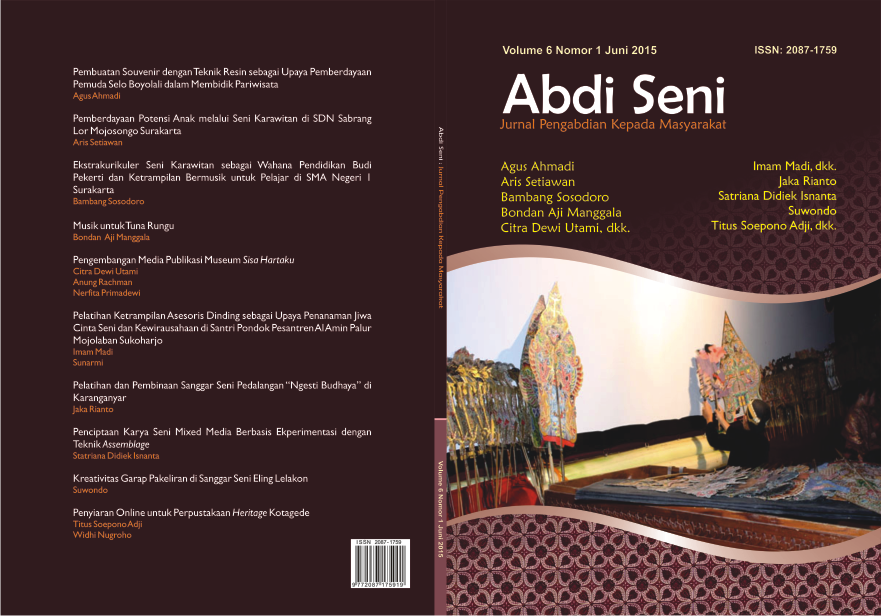MUSIK UNTUK TUNA RUNGU
Main Article Content
Abstract
Artikel ini merupakan ringkasan laporan hasil kegiatan program PPM, yang terkonsentrasi pada penciptaan karya dan pelatihan musik pada tuna rungu. Tujuan dari kegiatan ini ada mewujudkan langkah awal untuk memperoleh rumusan model pengembangan karya musik dan metode pelatihan yang akomodatif untuk diikuti dan dinikmati oleh tuna rungu. Program kegiatan dilakukan dengan beberapa tahap awalan yaitu (1) riset dan laboratoruim untuk menentukan material instrumen dan musikal. Selain itu, juga mengoptimalisasikan model komunikasi dalam proses bermusik dengan media visual (isyarat tubuh), auditif, dan getaran.
Keutamaan dalam aktivitas kegiatan ini adalah menciptakan “titik normal†antara kalangan berpendengaran normal dan tuna rungu dalam mengapresiasi dan berkegiatan musik.
Kata kunci: tuna rungu, model karya dan pelatihan musik.
Downloads
Article Details
License and Copyright Agreement
In submitting the manuscript to the journal, the authors certify that:
- Their co-authors authorize them to enter into these arrangements.
- The work described has not been formally published before, except as an abstract or part of a published lecture, review, thesis, or overlay journal. Please also carefully read Abdi Seni's Posting Your Article Policy at https://jurnal.isi-ska.ac.id/index.php/abdiseni/about/editorialPolicies#peerReviewProcess
- That it is not under consideration for publication elsewhere,
- That its publication has been approved by all the author(s) and by the responsible authorities – tacitly or explicitly – of the institutes where the work has been carried out.
- They secure the right to reproduce any material already published or copyrighted elsewhere.
- They agree to the following license and copyright agreement.
Copyright
Authors who publish with Abdi Seni agree to the following terms:
- Authors retain copyright and grant the journal right of first publication with the work simultaneously licensed under a Creative Commons Attribution License (CC BY-SA 4.0) that allows others to share the work with an acknowledgment of the work's authorship and initial publication in this journal.
- Authors can enter into separate, additional contractual arrangements for the non-exclusive distribution of the journal's published version of the work (e.g., post it to an institutional repository or publish it in a book), with an acknowledgment of its initial publication in this journal.
- Authors are permitted and encouraged to post their work online (e.g., in institutional repositories or on their website) before and during the submission process, as it can lead to productive exchanges and earlier and greater citation of published work.
Licensing for Data Publication
Abdi Seni uses a variety of waivers and licenses that are specifically designed for and appropriate for the treatment of data:
- Open Data Commons Attribution License, http://www.opendatacommons.org/licenses/by/1.0/ (default)
- Creative Commons CC-Zero Waiver, http://creativecommons.org/publicdomain/zero/1.0/
- Open Data Commons Public Domain Dedication and Licence, http://www.opendatacommons.org/licenses/pddl/1-0/
Other data publishing licenses may be allowed as exceptions (subject to approval by the editor on a case-by-case basis). They should be justified with a written statement from the author, which will be published with the article.
Open Data and Software Publishing and Sharing
The journal strives to maximize the replicability of the research published in it. Authors are thus required to share all data, code, or protocols underlying the research reported in their articles. Exceptions are permitted but must be justified in a written public statement accompanying the article.
Datasets and software should be deposited and permanently archived in inappropriate, trusted, general, or domain-specific repositories (please consult http://service.re3data.org and/or software repositories such as GitHub, GitLab, Bioinformatics.org, or equivalent). The associated persistent identifiers (e.g., DOI or others) of the dataset(s) must be included in the article's data or software resources section. Reference(s) to datasets and software should also be included in the article's reference list with DOIs (where available). Where no domain-specific data repository exists, authors should deposit their datasets in a general repository such as ZENODO, Dryad, Dataverse, or others.
Small data may also be published as data files or packages supplementary to a research article. However, the authors should prefer a deposition in data repositories in all cases.
References
Bunawan L. & Cecilia S.Y. 2000. Penguasaan Bahasa Anak Tunarungu, Jakarta: Yayasan Santi Rama.
Donald F. Moores. 2001. Educating The Deaf: Psychology, Principles, and Practices, Boston: Houghton Mifflin Company.
Evans R & Russell P. 1992. Manajer Kreatif, Jakarta: Binarupa Aksara.
Ira Puspitawati. 2008. Hubungan antara Kemampuan Komunikasi dengan
Kemandirian pada Remaja Tunarungu, Jakarta: Fakultas Psikologi Universitas Gunadarma.
Jonet Sri Kuncoro. 2006. Sebuah Catatan Harian, Laporan Karya Seni, Surakarta: Penciptaan Seni, Pasca Sarjana ISI Surakarta.
Kadarsih. 2009. Latihan Bina Persepsi Bunyi dan Irama Meningkatkan Kemampuan Berbicara Anak Tuna Rungu Wicara Kelas III SLB Negeri Sragen Tahun 2008/2009, Surakarta: Fakultas Keguruan dan Ilmu
Pendidikan Universitas Sebelas Maret.
Tati Herawati. 2007. Pengembangan Kemampuan Berbahasa dan Berbicara Anak Tunarungu, Bandung: Jurusan PLB FIP Universitas Pendidikan Indonesia.
Tika Verda Ayu R. 2013. Penggunaan Metode Audiolingual Terhadap Keterampilan Menyimak pada Siswa Tunarungu, Surabaya: Universitas Negeri Surabaya.
